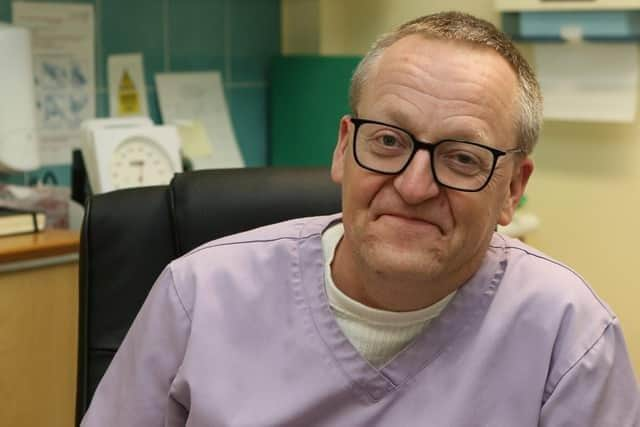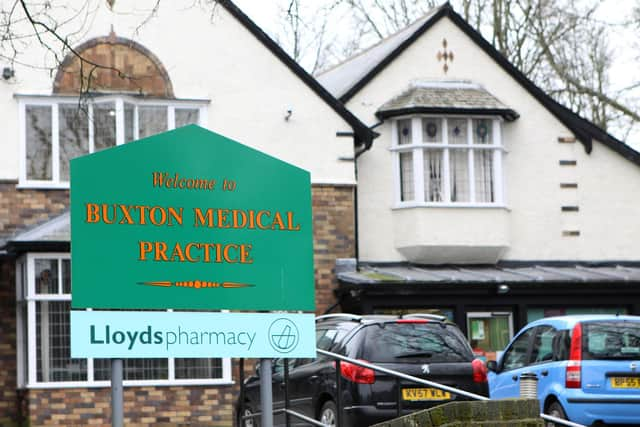GP's concerns as cervical screenings in High Peak falls below national average


Nationally nine people a day are diagnosed with cervical cancer - a disease which a High Peak doctor says can be spotted early if people go for their screening tests.
However, he says people are not coming for their routine screenings.
Advertisement
Hide AdAdvertisement
Hide AdDr Tom Miller, from Buxton Medical Practice, said: “Cervical screening is a way of preventing cancer.


“Having regular screenings means we can check if the cervix is healthy and spot any abnormalities early and treat them before it turns to cancer.
“But so many people aren’t coming for their screenings and we want to change this.”
Dr Tom says the practice has a target of 70 per cent for all eligible patients to attend their screening.
Advertisement
Hide AdHe honestly admits in the past 16 years the practice has never met that target.
“And it’s not through want of trying by the surgery.
Advertisement
Hide Ad“We put alerts on patients' records who are due a screening, send out two text messages as well as following up with a letter and a phone call but people just aren’t coming for their appointments.”
Patient Jo Carr said: “The reminders from the surgery are invaluable.
“You don’t have to think about when you are due a screening because they remember for you.
Advertisement
Hide Ad“I had a friend who had cervical cancer and she died from it, of course this isn’t the case for everyone but if you can get screened for a truly preventable cancer why wouldn’t you?”
Cervical screening is a way of preventing cancer. It tests for a virus called human papillomavirus (HPV).
Advertisement
Hide AdA spokesperson for Cancer Research UK said: “High risk HPV can cause cervical cells to become abnormal. Virtually all cases of cervical cancer are linked to high risk HPV.
“The cervix is part of the female reproductive system. It is the lowest part of the womb and is at the top of the vagina.
Advertisement
Hide Ad“A sample of cells is taken from the cervix using a small soft brush and sent to the laboratory for testing.”
The NHS cervical screening programme invites women from age 25 to 64 for cervical screening. Patients get an invite every three to five years depending on where they live and their age. People need to be registered with a GP to get your screening invitations.
High Peak patients will get an invite every thee years if you are aged 25 to 49. After that, people will get an invite every five years until age 64.
Advertisement
Hide AdA spokesperson from Jo’s Cervical Cancer Trust said: “There are a few myths that mean some women and people with a cervix think cervical screening isn’t relevant for them, including that screening isn’t necessary after menopause, they haven’t had sex for a long time, they have been in a monogamous relationship for years.
Advertisement
Hide Ad“However, we know that HPV can be dormant in the body for years and may become active again, which cervical screening can help detect.
“The media also sometimes focuses on cervical cancer as a ‘young person’s’ cancer. While 30 to 45 is the peak age for being diagnosed with cervical cancer, any woman or person with a cervix can be affected at any age.”Dr Tom wants to encourage more women to come when they are called up for a screening.
He said: “Neither me or my fellow male doctor at the surgery perform cervical screenings.
“We have three female nurses who all perform the screenings as we understand people don’t want to see a male for matters like this so we don’t do them in a bid to make people more comfortable.
Advertisement
Hide AdAdvertisement
Hide Ad“But even by making this change there are still barriers stopping people from coming in.
“We have found that those from lower socioeconomic backgrounds do not come for their screenings as much as those from better socioeconomic backgrounds.
“And I get it, I do. We’ve been through so much in the past few years, rent is going up, food and bills are going up and wages aren’t so people don’t want to leave work where they may not get paid and come for an appointment.
“So to combat that we offer screenings throughout the day as well as in the evenings on Tuesdays to give people more choice.”Speaking about the actual screening Dr Tom said: “Due to the nature of where a cervix is the nurses do need patients legs apart so they can see and we know people may feel embarrassed but we really do try to give people as much dignity as possible during the examination.
Advertisement
Hide Ad“Patients get changed behind a curtain, then are covered with a piece of large tissue at the top of their legs and different sized speculums are available as well.
Advertisement
Hide Ad“There are those patients who really are worried about coming, whether they are worried about the pain, the embarrassment, the results - whatever that may be, we are here to help.
“You can ring up for a telephone consultation and we can talk you through everything, we can have that same conversation before the screening takes place, you can bring a chaperone so you are not alone.
“We want women, and those who may have been born with female genitals so trans men, to be able to ask any question and be completely at ease with the process.
Advertisement
Hide Ad“We are here to help, we want to help you put your worries aside and be there for you and we want to help reduce cancer in our community.
“Cervical screening isn’t a test for cancer – it’s a way of preventing cancer from developing but people need to come to their appointments.
Advertisement
Hide Ad“If you have missed an appointment or never been before please just ring your doctor’s surgery wherever they may be and ask for a screening test.”For more information about cervical screening visit nhs.uk/conditions/cervical-screening/